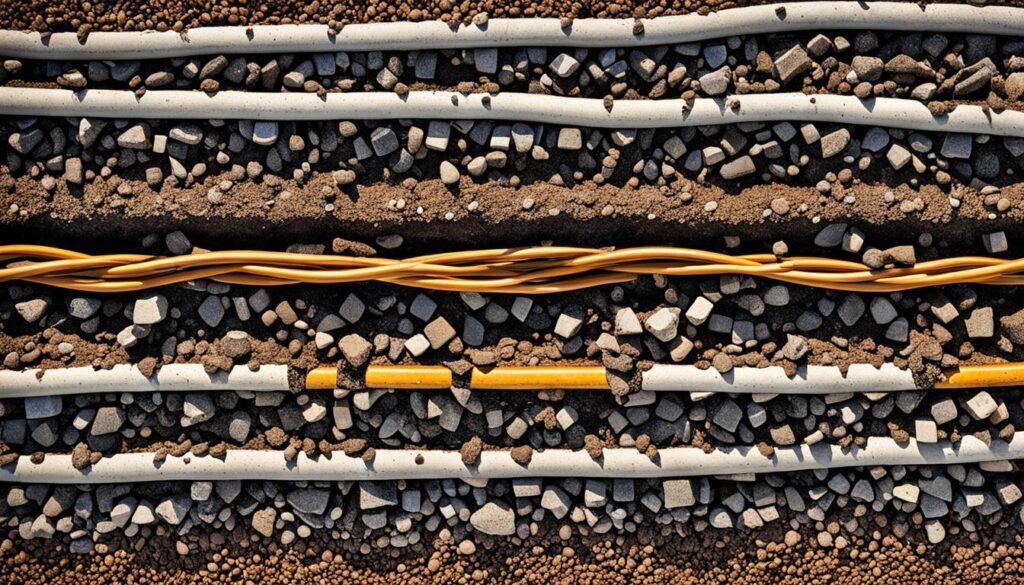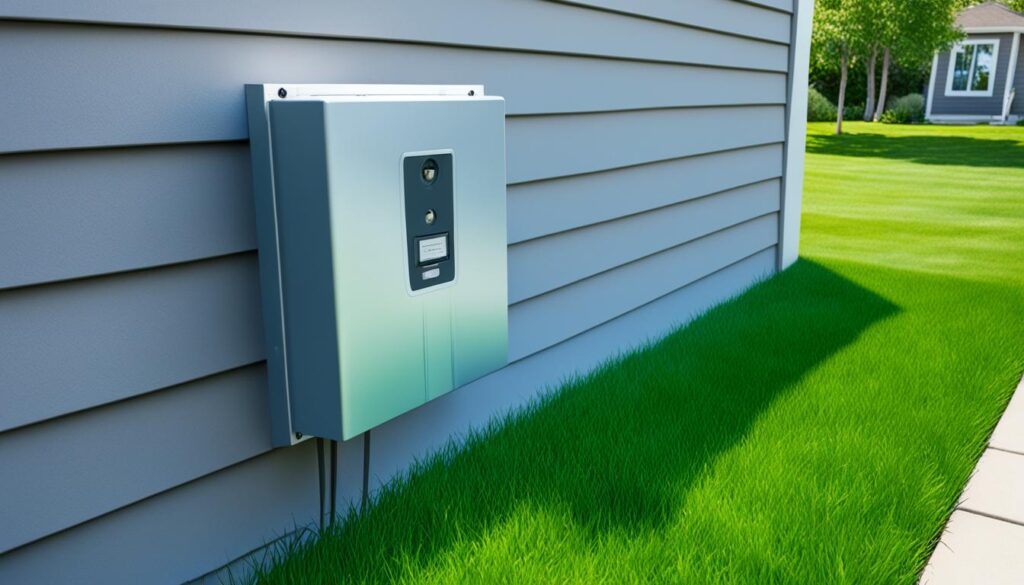Welcome to my comprehensive guide on AC outlets, where I will provide you with valuable information to maximize the convenience, functionality, and safety of your home. AC outlets, also known as electrical outlets or power outlets, are indispensable components of our everyday lives. They provide the necessary power to operate various electrical devices and appliances, from smartphones to kitchen appliances, and everything in between.
Understanding the different aspects of AC outlets, such as installation, replacement, wiring, types, and safety, is crucial for homeowners looking to optimize their electrical systems. Whether you are embarking on a renovation project, upgrading your outlets, or simply seeking to enhance the safety and convenience of your living space, this guide will equip you with the knowledge you need to make informed decisions.
- Discover the benefits of outdoor electrical outlets and how they can improve your daily life.
- Understand the importance of a dedicated circuit for outdoor outlets and how it contributes to safety and efficiency.
- Learn how to determine the optimal number of outdoor electrical outlets based on electrical code guidelines.
- Explore additional considerations for outdoor outlets, including bar height outlets, outlets for specific appliances, and more.
- Gain insights into the significance of consulting with experienced electricians for proper installation and compliance with regulations.
Key Takeaways:
- AC outlets are essential components that provide power to electrical devices and appliances in your home.
- Outdoor electrical outlets offer convenience and enhance safety by eliminating the need for extension cords.
- A dedicated circuit for outdoor outlets ensures proper functioning and avoids overloading indoor circuits.
- The optimal number of outdoor outlets is determined by electrical code guidelines.
- Consulting with electricians is crucial for proper installation and compliance with regulations.
Benefits of Outdoor Electrical Outlets
Outdoor electrical outlets offer a range of benefits that contribute to both convenience and safety in your outdoor spaces. By eliminating the need for extension cords, these outlets provide a simple and efficient solution for accessing power outdoors. Let’s explore the advantages of having outdoor electrical outlets and how they can enhance your outdoor living experience.
Convenience and Accessibility
With outdoor electrical outlets, you can easily power various devices and appliances without the hassle of using extension cords. Whether you’re setting up lighting for a backyard party or using power tools for outdoor projects, having convenient access to electricity makes your outdoor activities more enjoyable and efficient. No more searching for a nearby indoor outlet or dealing with tangled cords – you can plug in directly where you need it.
Eliminating Fire and Trip Hazards
Using extension cords for outdoor power needs can pose significant fire and trip hazards. Overloading extension cords by connecting multiple devices or using them improperly can lead to overheating and fire danger. Additionally, exposed cords can be a trip hazard, especially in high-traffic areas or when hidden by grass or other outdoor elements. By installing outdoor electrical outlets, you can eliminate these risks and create a safer environment for yourself, your family, and your guests.
- Minimizing Excess Electrical Cord
- Using extension cords often results in unsightly and potentially hazardous excess electrical cord lying around your outdoor spaces. It not only detracts from the aesthetics of your yard but also increases the risk of accidents. By having outdoor outlets strategically placed, you can reduce the visibility of pesky cords and maintain a tidy outdoor area.
Separate Circuits for Outdoor Use
Outdoor outlets can be connected to a dedicated circuit that’s separate from your indoor circuits. This is especially beneficial when it comes to powering multiple devices outdoors or using high-power-consuming equipment. By having a separate circuit, you can avoid overloading your indoor circuits, which could lead to tripped breakers or even electrical damage. It provides peace of mind knowing that your electrical system is properly and safely distributing the power throughout your home.
By understanding the benefits of outdoor electrical outlets, you can make informed decisions to enhance both the convenience and safety of your outdoor spaces. Consider consulting with a professional electrician to assess your outdoor electrical needs and ensure the proper installation of outdoor outlets.

Dedicated Circuit for Outdoor Outlets
When it comes to outdoor outlets, one consideration that homeowners may overlook is the installation of a dedicated circuit. While not required by the National Electrical Code (NEC), a dedicated circuit can greatly enhance the functionality and safety of outdoor outlets, especially if there are multiple outlets in a home.
A dedicated circuit is a circuit that is solely dedicated to a specific appliance or set of outlets. In the case of outdoor outlets, having a dedicated circuit means that the outlets are not sharing power with other indoor appliances or outlets. This separation of power ensures that outdoor outlets have a consistent and reliable source of electricity, reducing the risk of overloading and tripping circuit breakers.
According to NEC regulations, outdoor outlets should be protected by a ground fault circuit interrupter (GFCI) to prevent electric shocks in wet or damp conditions. By having a dedicated circuit for outdoor outlets, the GFCI protection can be applied specifically to these outlets, further enhancing their safety.
In addition, the use of underground electrical cables is often recommended for outdoor receptacles located away from the house. These cables are designed to withstand harsh weather conditions and protect against damage from landscaping activities. Underground cables not only provide a neat and concealed installation but also minimize the risk of accidental damage to the wiring.
Overall, a dedicated circuit for outdoor outlets is a valuable addition to any home. It ensures the proper functioning and safety of the outdoor electrical system, reduces the risk of electrical hazards, and provides peace of mind for homeowners.
| Dedicated Circuit Benefits | NEC Compliance | Underground Electrical Cables |
|---|---|---|
| Consistent and reliable power source | Complies with safety regulations | Protection against weather and landscaping damage |
| Reduces the risk of overloading circuits | GFCI protection specific to outdoor outlets | Neat and concealed installation |
| Enhances safety and functionality |
Installing a dedicated circuit and using underground electrical cables for outdoor outlets may require the expertise of a professional electrician. Their knowledge and experience ensure that the installation is done correctly, meeting all the necessary safety requirements and providing optimal performance.
Image: 
Determining the Optimal Number of Outdoor Electrical Outlets
When it comes to outdoor electrical outlets, it’s important to follow the electrical code guidelines to ensure safety and compliance. The National Electrical Code (NEC) specifies the minimum number of outlets required in newly constructed homes to meet the electrical needs of outdoor spaces. It is crucial to understand these guidelines to determine the optimal number of outdoor electrical outlets for your home.
The NEC mandates the use of ground fault circuit interrupters (GFCI) in outdoor outlets to protect against electrical shocks. GFCIs are designed to monitor the flow of electricity and quickly shut off power if they detect a ground fault. This ensures enhanced safety in wet locations and prevents potential accidents.
Weatherproof covers are essential for outdoor outlets as they protect the receptacles from moisture and debris, prolonging their lifespan. These covers shield the outlets from rain, snow, and other environmental elements, preventing water damage and potential electrical hazards. Furthermore, using metal electrical boxes in wet locations provides additional protection and durability, as they are less susceptible to corrosion.
To determine the optimal number of outdoor electrical outlets for your home, carefully assess the electrical needs of your outdoor spaces. Consider the types of electrical devices and appliances you plan to use, the layout of your outdoor area, and the convenience you desire.
I want to emphasize the importance of consulting with a professional electrician for an accurate evaluation of your outdoor electrical needs. They can provide valuable insights and recommend the appropriate number of outlets based on your specific requirements and the NEC guidelines.

Whether you need outlets for outdoor lighting, power tools, or entertainment systems, an experienced electrician can help plan the installation and ensure compliance with the electrical code guidelines. They can also assist in identifying potential challenges, such as the distance from the main electrical panel, and recommend the use of subpanels or additional wiring as needed.
In summary, determining the optimal number of outdoor electrical outlets involves understanding the electrical code guidelines, considering the use of GFCIs in wet locations, utilizing weatherproof covers, and incorporating metal electrical boxes for enhanced safety and durability. By consulting with a professional electrician, you can ensure that your outdoor electrical needs are met effectively and efficiently.
Additional Outdoor Outlet Considerations
While meeting the minimum outdoor outlet requirements specified by the NEC is important, many homeowners choose to go above and beyond to enhance the convenience and functionality of their outdoor spaces. Here are some additional considerations to keep in mind:
- Bar Height Outlets: If you have an outdoor kitchen or bar area, installing bar height outlets can make it easier to plug in appliances and power devices without the need for extension cords.
- Appliance Outlets: Consider installing dedicated outlets near outdoor appliances, such as refrigerators or grills, to ensure easy access to power whenever needed.
- Convenient Outlets: Strategically placing outlets near plantings or along walkways in your garden can make it more convenient to power electric landscaping tools or illuminate the pathway.
- Outlets for Holiday Lights: Don’t let holiday lights cause a headache every year. Install permanent outlets specifically for your festive lights to eliminate the hassle of setting them up and taking them down annually.
- Outlets for Porch Beams: By installing outlets on porch beams or pillars, you can easily power outdoor fans, heaters, or other features that enhance the comfort and enjoyment of your outdoor living space.
- Outlets in the Garage: If you have a workshop or use your garage for DIY projects, having extra outlets installed can make it easier to power tools and equipment, ensuring a smooth and efficient workflow.
When considering these additional outdoor outlets, it is crucial to consult with a professional electrician to ensure proper installation. An experienced electrician can assess your outdoor electrical needs, provide expert advice, and ensure that all installations meet safety standards and local regulations.
Remember, the goal is to create a convenient and safe outdoor space that meets your specific electrical requirements. With the help of a qualified electrician, you can enjoy the full potential of your outdoor living area.
Conclusion
Outdoor electrical outlets play a crucial role in meeting our outdoor electrical needs. They not only enhance safety and functionality but also create a pleasant ambiance in our outdoor spaces. Throughout this guide, we have discussed the numerous benefits of outdoor outlets, the regulations and considerations for their installation, and the importance of working with an experienced electrician to ensure their safe use.
By following the guidelines provided and seeking professional advice, homeowners can maximize the convenience of their outdoor electrical needs. Safety should always be a top priority when it comes to electrical installations. Properly installed outdoor outlets are essential in preventing accidents and protecting our loved ones and property.
Functionality is another key aspect to consider. Having outdoor electrical outlets allows us to power various outdoor appliances and devices, making our outdoor activities more enjoyable and convenient. From entertaining guests with lighting and music to powering outdoor cooking and heating equipment, these outlets provide the necessary electricity to make outdoor spaces functional and versatile.
To ensure the best results and compliance with regulations, it is crucial to consult with an experienced electrician. They possess the knowledge, skills, and expertise to handle the intricacies of outdoor outlet installation and ensure that all safety measures are met. With their guidance and expertise, homeowners can create outdoor spaces that are not only safe and functional but also aesthetically pleasing, enhancing the overall ambiance of their homes.

